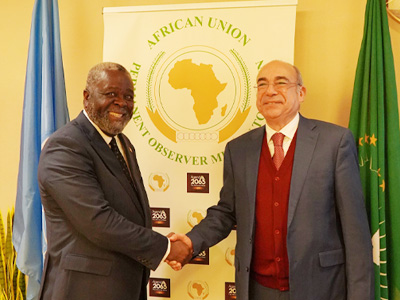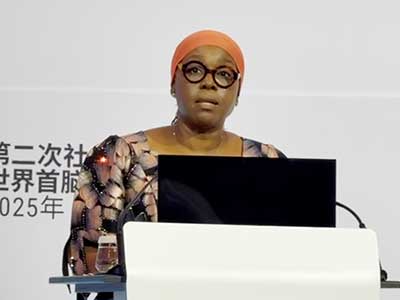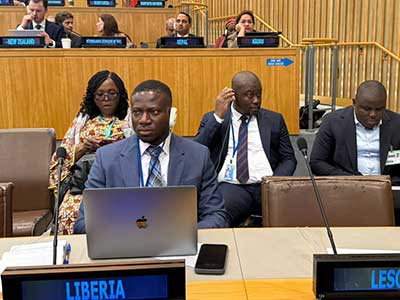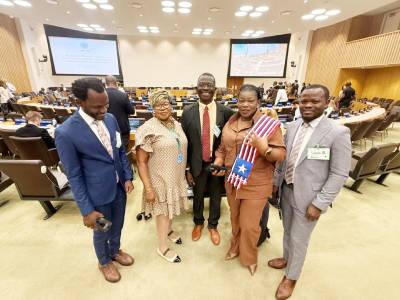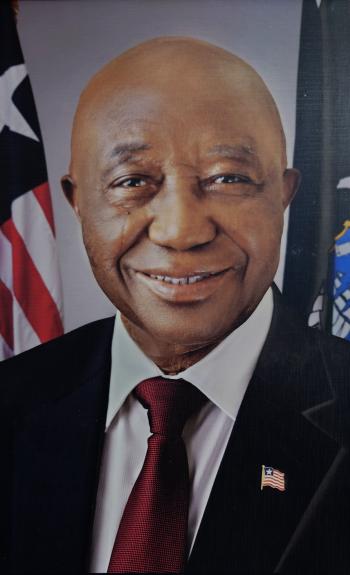Her Excellency Ms. Pramila Patten, Under-Secretary-General and Executive Director a.i, UN Women
His Excellency Volkan Bozkir, President, 75th Session of the UN General Assembly
His Excellency Mr. Maurizio Massari, Permanent Representative, Permanent Mission of Italy to the United Nations
Excellencies
Distinguished Ladies and Gentlemen
I bring you compliments through the Minister of Foreign Affairs, His Excellency Dee-Maxwell Saah Kemayah, Sr., from His Excellency Dr. George Manneh Weah, President of the Republic of Liberia, and Liberia’s Feminist in Chief.
It is a pleasure to join you today to share experience on priorities of women presidents of the General Assembly, including Liberia’s own, Dr. Angie Elizabeth Brooks, the second woman president of the General Assembly. I thank the Permanent Mission of Italy and UN Women for the invitation and opportunity.
The four women presidents we celebrate today are true trailblazers; they did not only ascend to a role traditionally led by men but excelled at the task and strived for the United Nations to become more relevant to the people.
Dr. Angie Elizabeth Brooks, like other women PGAs, had to pave her own road to victory in a hectic campaign at a time when many believed a woman should not hold the office. As a Tanzanian diplomat rightly put it then “Angie Brooks was selected not because she is a woman or a Liberian, but because she is Angie Brooks”.
Dr. Brooks was a quintessential diplomat and politician, a true trailblazer, and a continental pacesetter whose unmatched characteristics and sterling qualities illuminated Liberia’s image at the United Nations and the international stage, where she served with distinction.
Her work was driven by the principles of hard work, determination, and the quest to impact the next generation, as reflected in her famous quote: “We owe the peoples of the world who have invested in us their trust and their hopes, all our efforts, and our talents. Let us not betray their confidence in us by laying too much emphasis on peripheral issues rather than basic needs.”
Throughout her presidency, Dr. Brooks was a strong defender of women’s rights and gender equality, human rights, decolonization, and multilateralism. Her priorities as PGA included respect for human rights and fundamental freedoms through decolonization and the elimination of all forms of discrimination; welfare and development; women’s rights and gender equality; and peacekeeping—priorities that are still relevant to the work of the United Nations; especially the achievement of the Sustainable Development Goals (SDGs).
Excellencies,
Dr. Brooks made major gains implementing the priorities of her presidency in response to prevailing situations at the time. Dubbed “the mother” of the decolonization process in Africa, Dr. Brooks relentlessly fought for freedom for African people, as well as people of other continents. She led the implementation process and the special program of activities related to the 10th anniversary of the Declaration on the Granting of Independence to Colonial Countries and Peoples and oversaw the United Nations Trusteeship Agreements of more than 70 independence processes in different regions of the world. Notably, two countries changed their status during her presidency: first, Ifni, establishing autonomy from Spanish authority, and then Fiji, which declared its independence from Britain.
While her presidency recorded lots of successes, it is important to note that Dr. Brook’s work on decolonization did not begin with her PGA presidency. As Vice President of the Fourth Committee and the United Nations Trusteeship Council, she oversaw the independence of Cameroon, Mali, Ivory Coast, Madagascar, Barbados, Nigeria, Trinidad and Tobago, Singapore, and Congo, among other countries.
Dr. Brooks, a self-taught woman from an impoverished background, who overcame sociocultural and financial barriers to gain higher education, promoted women’s participation in politics and at international positions in public and private sectors, as well as women’s right to equal pay for equal work and equal opportunity and access to education. Dr. Brooks also worked to strengthen the Commission on the Status of Women.
Angie Elizabeth Brooks, the 2nd Woman President of the United Nations General Assembly, was a light on the pathway, not only for future women PGAs, but also for future generations of women in Liberia, Africa, and the world. We continue to be inspired by her determination and audacity.
Today we celebrate her work and that of other Women PGAs. Yes, we are extremely proud of their achievements and impact on society.
Today we celebrate that it is a woman PGA who saw the need to put a spotlight on women PGAs, to inspire and provide a space for discussion. We thank you, Ambassador Espinosa!
Yes, we’ve made strides in improving women's representation in politics and other fields. Yet, the disparity remains huge. Women continue to be underrepresented in major decision-making in the public and private sectors.
Today, more than ever, the younger generation, especially girls and young women, need role models. This need is made even more crucial considering the devastating impact of the COVID-19 pandemic, which is deepening pre-existing inequalities.
In addition to being role models, we have to continue to push for and ensure women’s equal representation in all COVID-19 response planning and decision-making. This will ensure that policies for post-COVID recovery capture an intentional gender lens to achieve greater equality, opportunities, and social protection.
For example, in Liberia, His Excellency President Weah named the Ministry of Gender, Children and Social Protection, headed by a woman, as a member of both the Special Presidential Advisory Committee on COVID-19 (SPACOC), as well as the Emergency Committee on COVID19 (ECOC). The Ministry, represented by Hon. Williametta Saydee Tarr leads two (2) pillars: “Psychosocial Pillar” and the “Women, Girls & Children Pillar”.
Beyond the policies, the Government of Liberia through the Ministry of Gender is enhancing advocacy for Gender Quota to increase women’s political participation through the inclusion of the enforceable 30 percent gender quota provision in Liberia’s election law; as well as the provision of relevant training for rural women, and implementation of social protection programs for empowerment in other sectors.
It is important to stress that the Government of Liberia under the administration of His Excellency President Weah continues to provide the space for women to thrive and be a part of decision making. The President’s Cabinet has four (4) women Ministers, leading the Ministries of Gender, Children & Social Protection, Health, Commerce, and Agriculture. In addition, over 65% of the Deputy Ministers and Assistant Ministers within the government are women. The Armed Forces of Liberia has its first female Deputy Chief of Staff; while at the Judiciary, two out of five Supreme Court Justices are women.
Excellencies,
As I conclude, let me emphasize that it is incumbent upon us women leaders and men leaders to continue lighting the path as the 4 women PGAs did and broadening the space for women’s empowerment. We must work together to close the gaps that hinder the achievement of gender equality.
Women Presidents of the General Assembly should not be an exception. It should be a norm.
I thank you!

